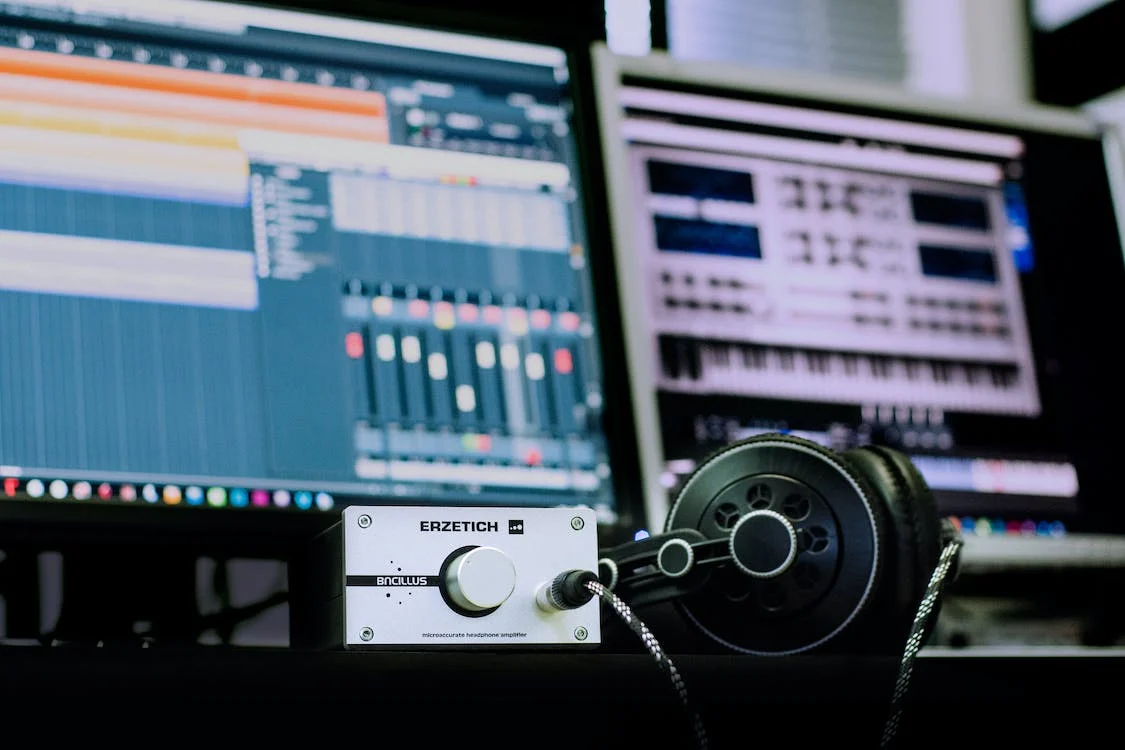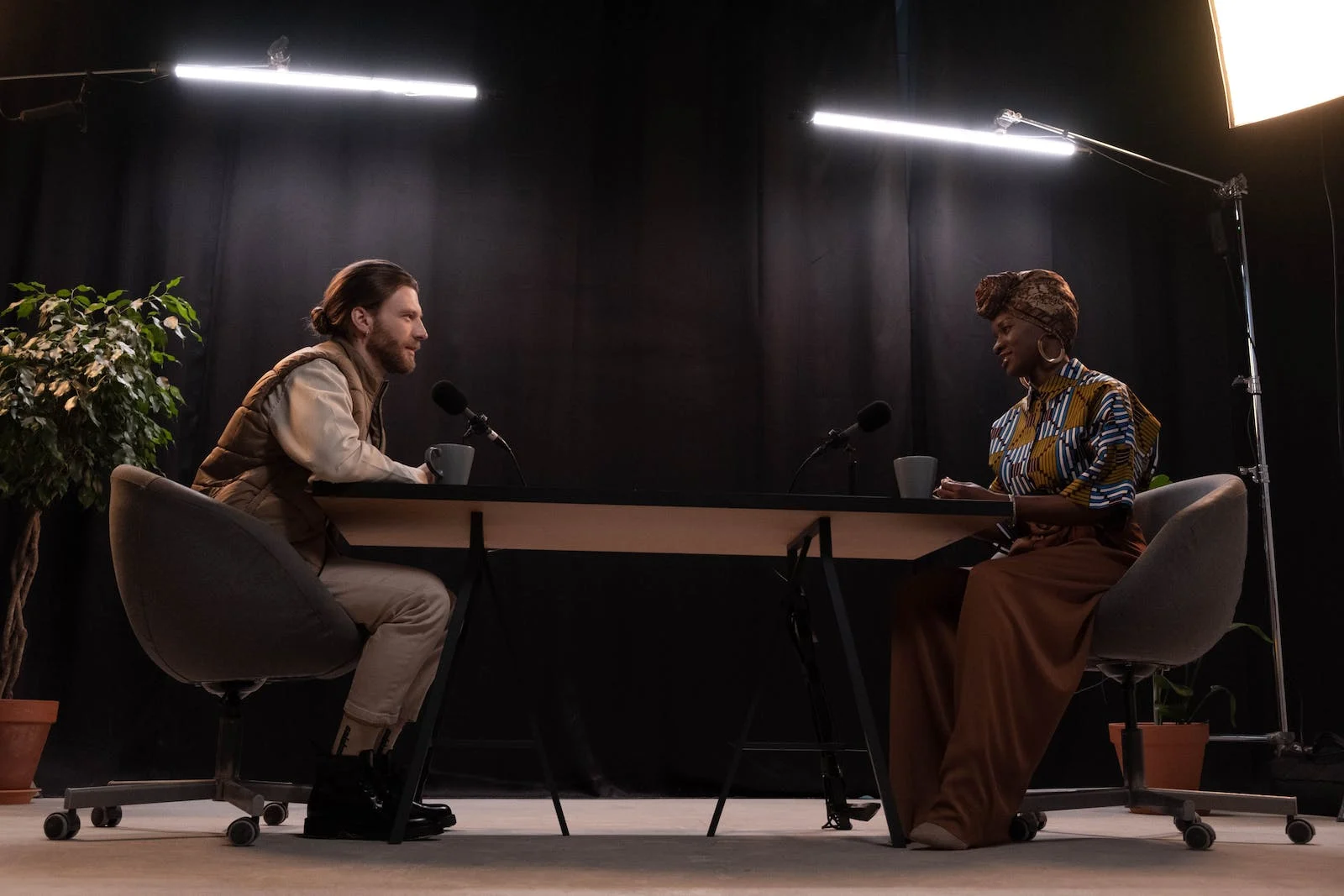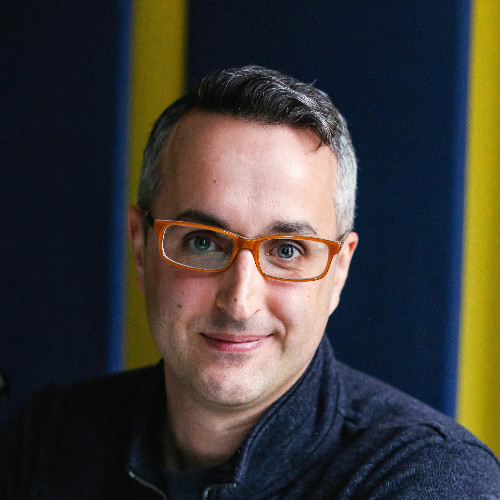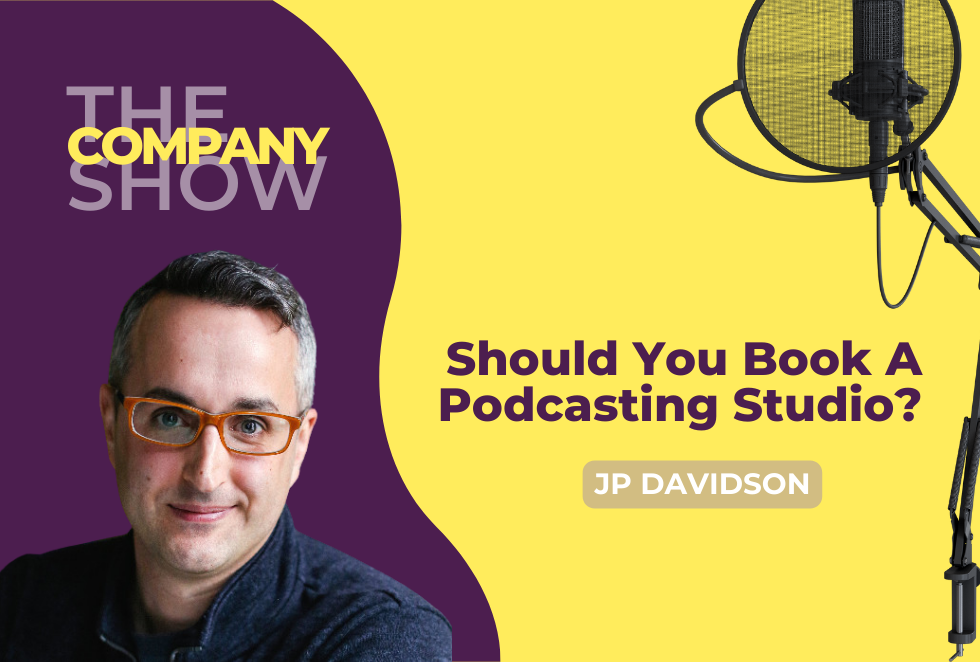There is not much that the best mic in the world can do about recording in a really sound-unfriendly environment. And some of us live in really sound-unfriendly environments.
If you are currently looking at your location options for podcasting and only finding places that are loud, echoey, or filled with blank empty spaces, but having the best possible audio quality for your show is important to you, then you might want to consider booking time at an in-person studio.
I’m personally quite lucky in that my home office is usually pretty quiet and I have enough fluffy stuff kicking around to minimize echo, but there have been days when I would have been delighted to be able to go somewhere quiet and just get my content out in peace.
Our guest today owns and operates just such a venue – and a production company to boot! JP Davidson is the creator of Pop Up Podcasting an Ottawa-based producer and studio.
If you want to learn who should book studio time and why – and what kind of value a live-on-a-call producer can provide, listen to our conversation below, or continue reading the post!
Tune in to the full episode to:
- Get a better understanding of in-person podcasting studios
- Learn about the different recording options for businesses
- Understand the role of the remote podcast producer
- Know what to look for in a podcasting studio
- Learn which processes should be outsourced vs done in-house
Don’t forget to join us for our free monthly strategy calls on the third Thursday of every month!
Pop Up Podcasting: A look into podcast recording studios

JP Davidson runs an in-person podcast recording studio where people can come and record their episodes. Here’s JP’s overview of what that entails:
The shows that they serve
We’re a production company as well as a physical studio space here in Ottawa, Canada. We’re right downtown and close to all kinds of businesses, government associations, and parliament buildings, so lots of different clients come through our space.
What’s their setup?
We have a four-person podcast studio with three cameras. We handle video, and we have some lighting for video as well, so we can do a video or audio. Then we handle a lot of the technical production as far as editing, setting up distribution for our clients, and that sort of thing.
Other services
We also advise and consult on marketing and other associated things. Although mainly we’re kind of a technical production house.
Things to consider when thinking about recording options for businesses
I work with a lot of companies that podcast. One of the big things at the beginning of the show is how am I going to capture the best audio to kind of give this project the best effort I can.
So if someone’s making the decision, should I set up my office to record, should I make a room in my house to record or should I book time with the professional studio?
According to JP, here are the things you need to consider when making that decision:
Can you do it in the long term?
I think a lot of the early kind of conversations around show design and how are we going to record this and all that. I like to bring up sustainability because I think a lot of us in podcasting know it’s a long game and doing a short burst and then running out of steam, and skipping the next six months of episodes doesn’t do anybody any good.
It’s really about what you can do consistently over the long term. So that really comes into it. If somebody is like, I work from home, it’s really hard for me to get downtown to record or over to a studio space, then for sure we work with a lot of clients who record at home, record from the office remotely.
That sustainability question is like, can you get to a studio space or is it going to be way better for you to be recording from home or from the office?
How much is your budget?
The other question is cost. It’s a bit more expensive to record from a studio. We do a hybrid approach where our producers will connect with people remotely and be a remote producer during the call.
And that helps a lot of our clients because there is this scary factor of technology when we’re recording in our own spaces, with our own microphone, on our own computer. And so having a producer on the line can help smooth those things over.
The studio is definitely the highest quality, most reliable way to do it. We double-record everything and back up everything. We have a producer on-site to fix anything that might be going wrong, reposition the microphones, and all that stuff.
But I totally recognize that a good number of our clients are remote because it can be the best solution for a lot of people.
An additional benefit to physical podcast studios

Another benefit of renting a physical space outside of your own workspace is there is an amount of accountability to that.
I find, especially for the solopreneurs or the owner-operators of small businesses, it’s really easy to backburner the marketing promotion work that podcasting often is.
But if you’re paying, you’ve got a monthly subscription, you’ve got three hours of podcast studio time, you’re going to go there and you’re going to use it and you’re going to get your studio time filled.
JP Davidson’s take on this:
Even just on that micro level. For example, I have an appointment at 11:00 a.m. on Thursday. I’m going to go and get my show done. That can be really helpful.
And the remote production that we do kind of has that built in too, because my producer is waiting for me at that time. I should say too, that we do a lot of hybrid. So host in the studio, remote guest, or vice versa. Some shows kind of flip between the two, depending on people’s availability.
My philosophy is that the host should always sound the best. That’s what we sort of have come to expect from listening to the radio and watching TV news and everything else. Whether the host is in the studio to sound great or they’re at home and we set them up with a nice microphone and the rest of it, we want everyone to sound great.
But the host is the one we can reliably control the most because they’re the consistent factor every week or every two weeks on the show.
Host vs guest audio quality: Who should sound better?
I feel it’s preferable to have the guest and the host sound a little more equal if there’s a huge disparity.
The question is, is it always better to make the host sound as good as possible? Or is there ever a case for making the host sound a little bit worse if it kind of decreases the gap between host and guest?
JP’s take:
With so many things around this stuff, it’s opinion and it’s art more than science. It hurts my heart a little too much to on purpose reduce audio quality. It’s never really occurred to me to do that to make them match up more.
I mean, let’s shoot high for everyone, but I wouldn’t necessarily draw. We’re used to that from radio. A host in a studio and a caller on a bad cell phone. We’ve heard it looking at you, CBC.
Maybe NPR in the States pays for tape syncs and brings people into the studio more. But here in Canada, we don’t do that. We’re hearing phone audio pretty often on the radio.
Considerations for audio quality
One of the things I think about it is because we have sort of the different podcast archetypes that we work with, longtime listeners will be familiar with the Blueprints, so we’ve got shows that are forethought leadership for establishing the brand of the company.
And then we’ve got shows that are more relationship-focused. And I’m just thinking of this now in that case, if it really is about building relationships with your guests, that’s when I think I’d try to equalize the audio..
The guest doesn’t hear it, but if it is a thought leadership, IP-focused show, just make everyone sound as good as possible, but focus on that host.
Because you don’t want to dunk on your guests if they’re right. If you’re trying to make them the star of the show.
What does a remote producer do in an in-person podcast studio?
For JP’s podcast studio, it’s a little bit different:
It’s largely on the technical side, although we’ll also chime in often at the end of the conversation, we’ll chime in and say the answer to that question was sort of muddled. Let’s retake that. You used this acronym throughout and never defined it. Maybe let’s define that.
It’s the stuff that I was producing podcasts as a freelancer for years. People would record on their own and send me audio and the stuff where I was like, I wish I could have been there to ask them to do this or change this.
And it’s the same thing. On the technical side, we’ve connected with clients before and they have the ATR2100x here, the classic podcast USB mic.
But we’ve had so many people have this great mic in front of them, and then the laptop mic is selected or the webcam mic is selected and you’re like, you had it right there. Why didn’t you flip it on? Or the blue yeti that’s tipped towards the mouth instead of the face towards the mouth and sounds terrible as a result.
So we did a quick sound check at the beginning and just to make sure that everybody’s kind of doing everything they can to sound great. And sometimes it’s close the window, I can hear the traffic noise or whatever, where we shepherd people through the process. And it really just came out of my frustration with people’s self-taped audio, to be honest.
Related:
With a little bit of knowledge and caring, people can do this stuff on their own.
There’s only so many things it can really be. If someone sounds off, it’s going to be your input or your output or your environment for the most part, and occasionally something weird and distressing that no one has ever run into before.
You’re supposed to be the expert on the call and we’re tearing our hair out. Like, what is that sound? Why don’t you sound better for those listening?
If you are kind of in the position where you’re trying to make that decision, if the thought of having to deal with an extra tech thing horrifies you look for a production company that offers remote producer services because that does take the problem completely off of your desk.
The tools and tech for remote podcast recording
Electro-Voice RE320
They’re a little bit different internally, but I really like them. And they were a little bit cheaper than SM7Bs when I was setting up the studio. And when you’re buying four, the cost matters. But I think they sound just as good as the classic SM7B.
My take on the Shure MV7
I downgraded from the SM7B because, interestingly, I’m very podcast-affiliated. I’m not a gearhead, I’m not the audio engineer. I’ve got wonderful team members who do that. It was just too much mic for me. It had too many settings. The M7, I could plug it in and it would just work as a non-techie person. That’s what I needed.
JP Davidson uses a USB mic at home, too, because of the simplicity of it, if you only need one mic in the room and it’s connected to a computer, you’re all set with that.
Riverside
I’ve had a few headaches with Riverside, to be honest. I think if you use any piece of technology enough, you’re going to run into things. But it’s the best thing going for us so far.
And every so often we’ll do things via Zoom. If the guest really is having trouble with Riverside, we need simplicity and speed over quality. But Riverside is a great platform for that.
What should you look for in an in-person podcasting studio?
A dedicated producer for each client
One of the things that we pride ourselves on is having a dedicated producer for every client. And that’s not to say we don’t work as a team. If somebody’s sick, we can fill in and all the rest of it.
But you’re going to have one point of contact and that’s more important than you might think because there are always little differences with each client. Like we know the host always likes to sit in this chair for this particular show and having that kind of personalization is a nice touch.
Do they offer video podcasting?
There’s a lot of people offering podcast recording in studios now, and there are a lot of differences in the services provided. So I think looking at that video or no video is one thing, but then if you know you want video and more and more of our clients are at least recording like, you do video for clips, even if you’re not.
The data backs it up. You’ve got to have at least an MP4 version on YouTube at this point. It’s best practice now.
Does the studio have enough cameras?
So do you have video but then are there multiple cameras? Our studio has three cameras, so we can make a more dynamic show for people. In some cases, you can go to somewhere that specializes in music recording, but they’re like, we have a table, we have microphones, we have chairs, whatever it is, we can set you up.
Is the environment right for you?
Thinking about the environment, especially for business podcasters, the environment you’re bringing your clients into and depending on the nature of your business, like a cool music recording space might be perfect, but it might not be the vibe everybody’s going for.
So somewhere that’s going to be a professional space where you can kind of wow your guests and give them the experience of being in this professional podcast space that’s dedicated to the task.
Especially if you’re using a relationship-building strategy, particularly if you don’t have premises, if you don’t have your own company office, having a really nice professional, well-prepared space to bring your guests who could be potential clients, who could be potential referral partners too.
It can just be a small investment into a really good impression.
Should you outsource or do it in-house?
A lot of the clients we work with have a communications team or a marketing person or somebody who has some specialization in what we’re trying to do. And I think the way that that division happens is going to be different for everyone and hopefully you can find a partner that has some flexibility as far as that goes.
We do kind of try to customize that based on the client. But the techie nitty gritty stuff that we’ve talked about so far is probably best left to us unless you have a really capable internal AV person who can help with this stuff.
But a lot of people outside of the podcasting industry don’t know about Riverside and Squadcast and Descript and these kinds of things. So kind of leaving that to the pros, I think can be helpful and can be a huge time saver because podcast editing and video editing are slow, even for us.
But it can be four times slower if you’re learning the software as you’re going and all the rest of it There’s a non-zero chance you’re going to hate it because it takes a special brain to be into audio-video editing.
I think the podcast-specific stuff can be helpful. So you know that a marketing and communications professional is going to know how to get the word out about things in different ways, but maybe they’re not going to know that we have these typical sort of intro outro scripts for podcasts and how those go together, and the fact that you shouldn’t go on and on for three minutes in an intro is long.
Then we have the distribution setup. I think is still tricky and specialized, and even for me, who’s done it a lot.
The stuff that should be done in-house
The stuff that should be in-house is more around guest selection. A lot of major editorial decision-making. We work with our clients on that often, and sometimes it’ll be the answer to question four is, like, way off base as far as the company line goes.
That’s got to go. That’s a quick thing for the client to tell a producer or an editor, but stuff that we wouldn’t know, right? Because we’re not in that industry and we don’t know every company policy or how we talk about things or don’t talk about things.
We found that’s a big part of our onboarding process because we do a lot of written materials for the shows that we produce as well as we do show notes. We do often social shares and guest notifications, and if something needs to be cut, I always recommend the writing go first because we work with a lot of highly niched companies and there’s only so much our writers can do.
They’re not compliance lawyers, nor financial services advisors, nor an author whose voice is their money maker. So that’s always kind of the balance between we’re going to do really good industry-level stuff. It’s not going to be as good as if you wrote it yourself. It’s not on the table.
Probably not a great business decision, but I’ve dragged my feet on doing client show notes. There’s a handful that we do that goes okay once you figure out the style and all the rest of it. But a lot of it, especially if they have anyone internally who can do a better job, will defer to them pretty quickly.
Creating show notes for podcasts
What’s interesting, I don’t know if you know what’s up. We do the State of Business Podcasting Report every year, and one of the things we look at is what these top 100 business shows do for their show notes. A shocking number of them are single sentences.
I think the style that we do that’s the most popular is a really good descriptive paragraph, a couple of sentences, guest bio if they have one. It’s almost always a relationship-building plan. Then just key quotes or highlights, some of the most interesting things, and then resources and it’s simple enough that doesn’t have to be super, super on-brand voice for a company.
And it’s easy enough for anyone who needs to do that writing to get it more or less correct. So much of it is about SEO, so you’re getting those keywords in. You’re halfway there.
Relationship Building Through Podcast Production
One of our clients, the Business Council of Canada, is this association of Canada’s biggest CEOs of Canada’s biggest companies.
Their podcast is called Speaking of Business and their CEO, Goldie Heider talks to these titans of Canadian business, and it’s half about him building the relationship with his membership and half about informing the membership of here’s who we are and where we are.
But then it’s not strictly internal because it’s also like, I can be a fly on the wall for this candid conversation between the CEOs of some of the biggest companies in Canada. None of it is really breaking out of the mold, but they do a nice job of as much as everything being said often has to be lawyered at that level.
It’s candid enough and it’s kind of enough of a twist on what you hear these people say on the evening news. It’s interesting to the average listener, even if you’re not a business magnate.
A small downside of working with big businesses
When we have clients and they’ve got this really great guest from this really huge company. On the outside, I’m going, “Yay, good for you!” On the inside, I’m going, “Oh no, we’re going to have a three-month review process, aren’t we?”
The problem with scripted responses
We’ve had guests come in with, like, their communications person, fully scripted their responses to every question. That’s just not great audio.
If you’re not a professional voice actor, it’s hard to sound off the cuff if you’re reading right. That’s one of the ones.
Our clients are kind of all over the map. Care Canada, a large nonprofit does work in Africa, is a client, and they have a great show where their program is all about teaching young women sexual and reproductive health in these African countries.
They have young women hosting it and kind of running the show. So it’s a very youth-led project that’s sharing information to the people that need it, but also building that link between Canada and Africa.
Interested in Pop Up Podcasting?
Visit their website, https://popuppodcasting.ca/
They do remote production work with folks across Canada and beyond.
You may also contact JP through jp@popuppodcasting.ca (he would be be happy to chat!)
Resources
One Stone Creative | LinkedIn | Twitter | Facebook | Instagram
Make sure to check out our free Monthly Strategy Calls!
Podcasting for Business Conference 2023
Learn about what other business podcasters are doing
JP Davidson Pop Up Podcasting | Personal Site | LinkedIn | Twitter
Related:
- Working with VAs for Your Podcast with Kristy Yoder
- Getting the Best Sound From Your Home Studio (or Kitchen Table) with Junaid Ahmed
- Achieving Business Goals with Podcast Managers | Ted Cragg
- Acoustic Treatment for Your Home or Office Studio
About JP Davidson

“JP Davidson is the founding producer of Pop Up Podcasting. He started podcasting as a hobby in 2010, and it quickly became an obsession and a career.
Before founding Pop Up Podcasting in 2017, JP studied audio documentary at the Transom Story Workshop; produced stories for CBC Radio; taught podcasting workshops; and worked to launch podcasts for clients like RBC, Greenpeace, and The Globe & Mail.
He’s also founded groups to help podcasters connect: The Canadian Sound & Story Workshop, and Ottawa Podcasters.
When he’s not thinking about podcasting, JP can be found nerding out on the latest tech trends, and trying desperately to keep up with his increasingly quick toddler.”
PFBCon 2023
Have you gotten your ticket for the Podcasting for Business Conference yet? There is still plenty of time and there is content ready and waiting for you right now.
It’s the recording of last year’s event and they are fantastic just like this year’s presentations are going to be.
Learn more and check out the speaker lineup and our vast array of networking opportunities over at www.pfbcon.com

